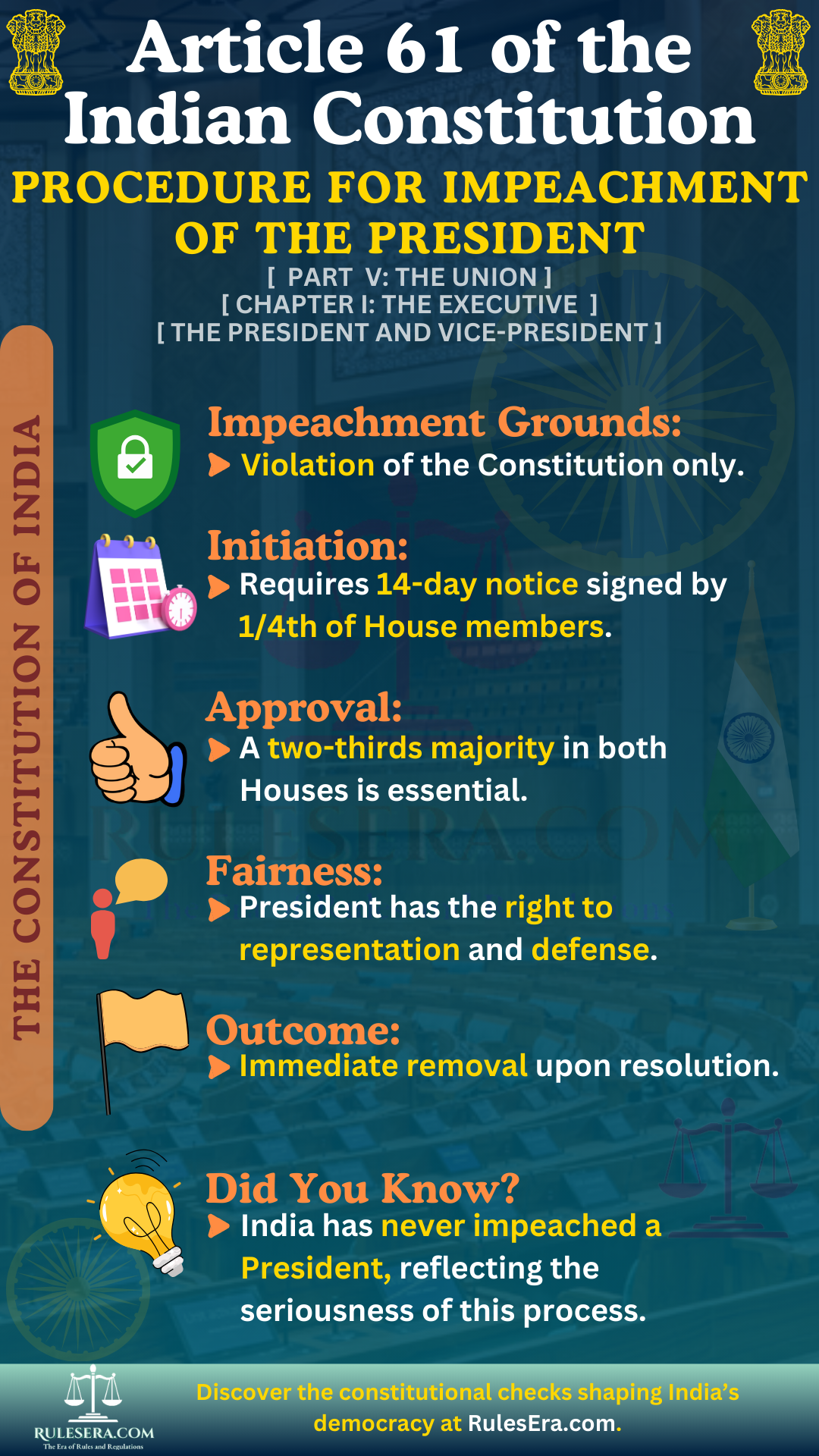Part V: The Union
Chapter I: The Executive
Article 61: Procedure for Impeachment of the President

--- Original Article ---
(1) When a President is to be impeached for violation of the Constitution, the charge shall be preferred by either House of Parliament.
(2) No such charge shall be preferred unless—
- (a) the proposal to prefer such charge is contained in a resolution which has been moved after at least fourteen days' notice in writing signed by not less than one-fourth of the total number of members of the House has been given of their intention to move the resolution, and
- (b) such resolution has been passed by a majority of not less than two-thirds of the total membership of the House.
(3) When a charge has been so preferred by either House of Parliament, the other House shall investigate the charge or cause the charge to be investigated and the President shall have the right to appear and to be represented at such investigation.
(4) If as a result of the investigation a resolution is passed by a majority of not less than two-thirds of the total membership of the House by which the charge was investigated or caused to be investigated, declaring that the charge preferred against the President has been sustained, such resolution shall have the effect of removing the President from his office as from the date on which the resolution is so passed.
Explanation
Article 61 of the Constitution of India establishes the procedure for the impeachment of the President for violations of the Constitution. It outlines a structured process that ensures fairness, transparency, and thorough investigation. Impeachment, as a serious action, is designed to uphold the integrity of the President's office and maintain constitutional order.
Key Provisions
- Initiation of Impeachment Proceedings (Clause 1): Either House of Parliament can initiate the impeachment process. The grounds for impeachment are limited to "violation of the Constitution."
- Notice of Impeachment and Voting Requirements (Clause 2): Impeachment proceedings require a formal resolution with at least one-fourth of the House's members signing a notice. The resolution must be passed by a two-thirds majority of the House.
- Investigation and the President's Rights (Clause 3): The other House investigates the charge, with the President having the right to appear and be represented at the investigation.
- Removal of the President (Clause 4): If two-thirds of the members of the House conducting the investigation sustain the charges, the President is removed from office, effective from the date the resolution is passed.
Amendments and Real-Life Examples
- Amendments: Article 61 has not been amended. The procedure it outlines remains the foundational process for constitutional accountability of the President.
- Real-Life Example: No Indian President has been impeached to date, reflecting the gravity of this process. President V. V. Giri faced political tension in 1974, but no formal charges were preferred. The provision remains a safeguard for constitutional accountability.
- Emergency Controversy (1975): Following the 1975 Emergency declared by President Fakhruddin Ali Ahmed, political debates arose about executive overreach, but no impeachment proceedings were initiated. This illustrates the high threshold for invoking Article 61.
Historical Significance
Article 61 draws from parliamentary systems around the world, such as the United States, where impeachment serves as a constitutional check on executive power. It reinforces the principle that no office, including the President's, is above the Constitution.
Legislative History
Article 61, originally drafted as Article 50, was debated and incorporated into the Constitution on December 28, 1948. The provisions have remained unchanged, reflecting the framers' commitment to a fair, transparent process for impeaching the President.
Debates and Deliberations
During the debate on Article 50 of the Draft Constitution, Kazi Syed Karimuddin proposed adding "treason, bribery, or other high crimes and misdemeanors" as grounds for impeachment, citing the American Constitution. However, this was rejected as "violation of the Constitution" was considered broad enough to cover such offenses.
Prof. K.T. Shah argued that impeachment should only be initiated by the Lok Sabha, the directly elected "People's House," claiming that the Council of States (Rajya Sabha) was not fully representative of the people. However, this suggestion was also not accepted.
Shri Shankarrao Deo successfully proposed that a minimum of one-fourth of a House's members must support an impeachment motion, ensuring its seriousness. Additionally, Mr. B.M. Gupte's suggestion for a 14-day notice period for impeachment proceedings was accepted, aligning with removal processes for other high officials.
Dr. B.R. Ambedkar defended the two-thirds majority requirement for impeachment, emphasizing that such an action should have serious consequences. He explained that "violation of the Constitution" was sufficient to encompass serious offenses like treason and bribery. Ambedkar rejected additional disqualification provisions, arguing that public and parliamentary judgment would prevent impeached individuals from holding future offices.
The Assembly adopted Article 61 with a few modifications, ensuring a balanced and dignified process for the President’s impeachment.
Frequently Asked Questions (FAQs):
Impeachment proceedings against the President can be initiated by either House of Parliament, with the charge being for "violation of the Constitution."
A two-thirds majority of the total membership of each House of Parliament is required to pass an impeachment resolution.
No, no Indian President has been impeached to date. The impeachment procedure is a serious constitutional mechanism meant for extreme cases.